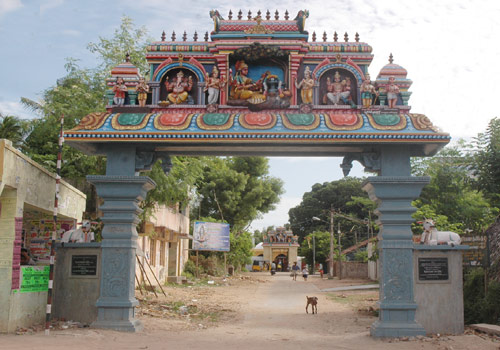Due to his sins, a demon Manmasudhan was born as a cancer
(nandu in Tamil). He sought advice from Mahrshi Narada for relief. As
advised, he came to this place, bathed in Cauvery and worshipped Lord
Shiva. Pleased with his penance, Lord granted darshan to him. To
facilitate his merger with Him, Lord also made a hole in Himself. Nandu
entered into the Linga through the hole and got merged with Lord.
The
hole is visible on the Linga. Sun God had worshipped Mother Veyuru Tholi
Ammai in this temple. As Sun-Aditya worshipped, She is praised as
Aditya Varada Ambica. Planet Saturn is opposite Ambica shrine facing
east. The devotee can have the darshan of Mother and Saturn
simultaneously for removal of the adverse aspect of the planet. There is
no Navagraha-9 planets, shrine in the temple.
Mother Badrakali in a
separate shrine had worshipped Lord in the temple. As a rule in Hindu
customs, people worship Lord Vinayaka before commencing any work. They
then have to follow the advice of elders. Lord Vinayaka in the temple is
considered elder, experienced and adviser. The three aspects are
praised as Chintamani Vinayaka, Selva Maha Vinayaka and Shivananda
Vinayaka.
Any one starting a business prays to Vinayaka in this temple
for profitable results. A soldier Munayaduvar by name had an army
himself and was assisting Kings in their battles. He spent the income
thus earned for the maintenance and renovation of the temple and to
serve Shiva devotees. Lord Shiva granted Darshan to Munayaduvar and
placed him one among the 63 saivite nayanmars.
Besides having his own
shrine, he is also the procession deity in the temple. Guru Puja for him
is celebrated on the Poosam star day in the month Panguni-March-April
and taken in procession. Needur in Tamil means eternal place. As this
place could not be destroyed even at the end of the world by the great
floods-pralaya, it is named Needur. The other names of the place are Vagularanyam and Magularanyam.
Thiruneedur Somanathaswami Temple is a Hindu temple located at Needur in Nagapattinam district of Tamil Nadu, India. The historical name of the place is Sapthapuri. The presiding deity is Shiva. He is called as Somanathaswami. His consort is known as Veyurutholi Ammai.
Lords Sivalokanathar, Kailasanathar, Kasi Viswanatha,
Ananda Thandavamurthy, Chinamayananda Vinayaka, Muruga and Saptha
Kannikas are in shrines in the prakara. Lord Nataraja is in Sudha form.
Siddhi Vinayaka graces the devotees from His shrine. The vimana in the
sanctum sanctorum is of Irudala design.
Prayers:
Those
facing delays in wedding matters, concerned with the welfare of
children, seeking pardon for wrongs done pray for solutions.
Moolavar:Somanathaswami
Urchavar:Somaskandar
Amman/thayar:Veyurutholi Ammai
Temple/tree:Magizham
Theertham:9 theerthas
Do's:
- Do pray your Ishta Devata before pilgrimage to Temple.
- Do contact Temple Devasthanam information centre for enquiry, temple information and for Pooja details etc.
- Do reserve your travel and accommodation at Temple well in advance.
- Do bath and wear clean clothes before you enter the temple.
- Do concentrate on God and Goddess inside the temple.
- Do maintain silence and recite Om Namahsivaya or your Istamantram to yourself inside the temple.
- Do observe ancient custom and traditions while in Temple.
- Do respect religious sentiments at Temple.
- Do deposit your offerings in the hundi only.
Don't s:
- Do not come to Temple for any purpose other than worshipping of God and Goddess.
- Do not smoke at Temple.
- Do not consume alcoholic drinks at Temple.
- Do not eat non-vegetarian food in the Kshetram.
- Do not approach mediators for quick Darshanam. It may cause inconvenient to others.
- Do not carry any weapon inside the temple.
- Do not wear any head guards like helmets, caps, turbans and hats inside the temple premises.
- Do not perform Sastanga Pranama inside the Sanctum Sanctorum.
- Do not take much time while performing Sparsa Darshanam to God in Garbhagriha.
- Do not buy spurious prasadams from street vendors.
- Do not encourage beggars at Temple.
- Do not spit or create nuisance in the premises of the temple.
